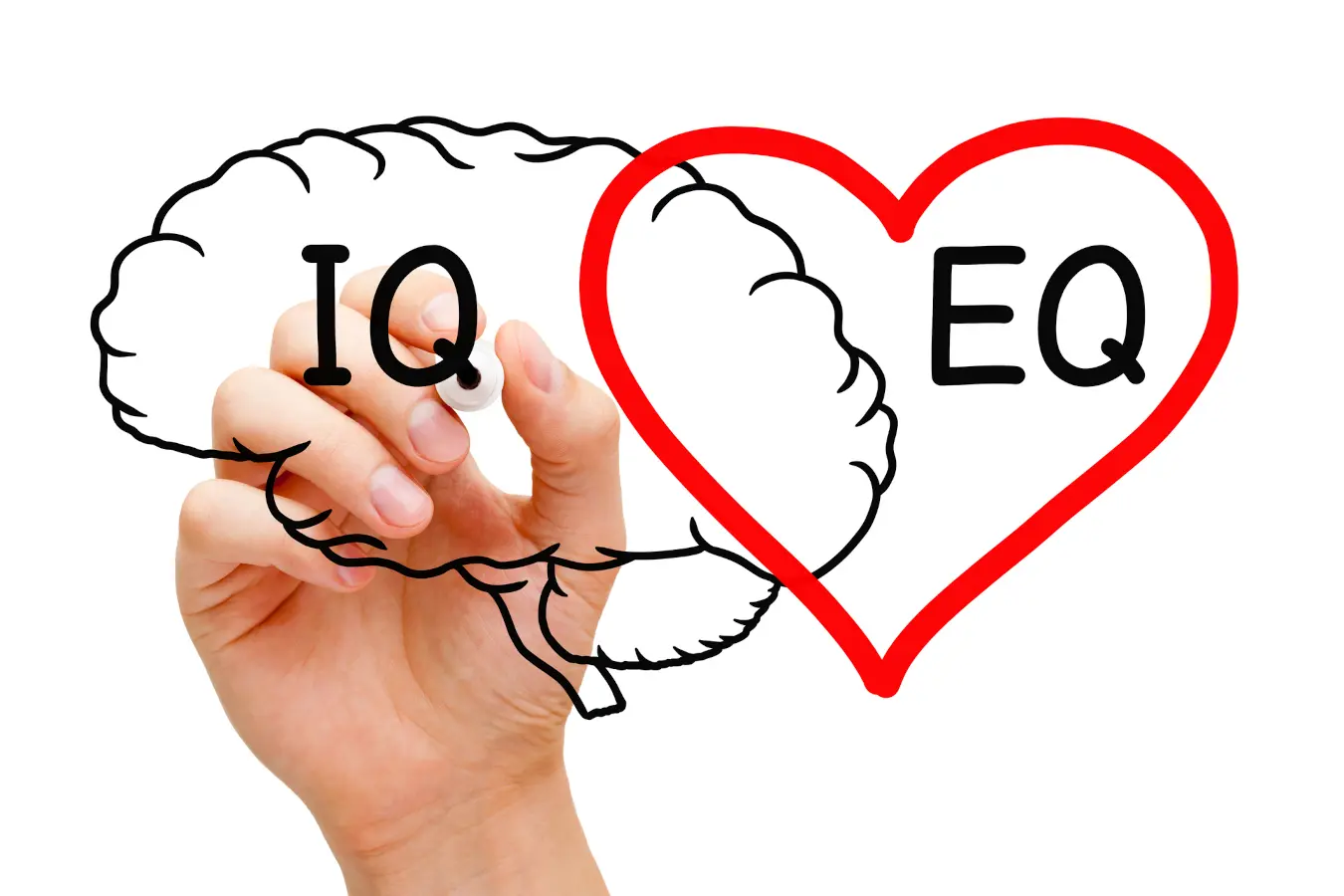Emotional intelligence shows up everywhere – often quietly. It helps you defuse tense moments at work before they explode, sense when a friend needs space instead of advice, recover faster after criticism, and make steadier decisions under pressure.
If you’ve ever wondered how to know if you have high emotional intelligence, psychologists point to specific patterns and behaviors that show up in everyday life – often in subtle, quiet ways. These “signs of high emotional intelligence” help explain why some people navigate conflict, stress, and relationships more skillfully than others.
People with stronger EQ tend to handle conflict more constructively, communicate with empathy, and sustain healthier relationships at home and at work. It’s not about “being nice” – it’s about being attuned, responsive, and balanced when emotions (yours or others’) run high.
Emotional intelligence (often called EQ or EI) isn’t about being perfect or always knowing what to say, either. It’s about how well you understand, use, and manage emotions = your own and other people’s – to navigate life’s challenges with awareness and composure. Psychologists Peter Salovey, John Mayer, and David Caruso describe it as four core abilities: perceiving emotions, using emotions to guide thinking, understanding emotional dynamics, and managing them effectively. This “ability model” underpins validated measures such as the Mayer-Salovey-Caruso Emotional Intelligence Test (MSCEIT), which demonstrates moderate reliability and remains a foundational framework in EQ research.
Disclaimer: This is not a diagnostic tool. These signs correlate with higher EQ in studies, but exhibiting some doesn’t guarantee “high EQ,” and not exhibiting all doesn’t mean you lack it. If emotional distress (anxiety, mood, relationships) becomes disruptive, consult a licensed mental health professional.
21 Research-Backed Signs You Have High Emotional Intelligence (Even If You Doubt It)
Below are 21 research-backed signs you may have high emotional intelligence, drawn from the ability-based model of EQ. These quiet indicators appear across communication, self-regulation, empathy, and real-world decision-making.
Self-Awareness & Insight
1) You name your emotions with nuance (beyond “good or bad”)
Many people default to coarse labels (“I’m mad,” “sad”), but you might more often think or say: “I’m anxious, uneasy, overwhelmed, disappointed.” This emotional granularity is tied to healthier coping, fewer impulsive responses, and better psychological well-being in empirical studies.
When you do this, you’re fostering better introspection – essential for emotional regulation.
2) You verbalize your emotions (affect labeling)
Putting feelings into words – sometimes called affect labeling – isn’t just catharsis. fMRI work (e.g. Lieberman et al.) shows that affect labeling reduces amygdala activity and increases ventrolateral prefrontal cortex (vlPFC) engagement, helping tame emotional reactivity.
SAGE Journals
In short, saying “I feel frustrated” does more in your brain than you might expect.
3) You notice your triggers and emotional patterns
You may keep tabs on when certain moods or irritations tend to flare – perhaps around deadlines, relational tensions, or fatigue.
You see antecedents → reactions → consequences patterns (often called “ABC mapping” in behavioral science). That insight helps you preempt or redirect emotional spirals.
4) You treat yourself with compassion during stumbles
ID 145770024 ©Pogonici | Dreamstime.com
Instead of harsh judgments when you mess up, you lean toward a kinder inner voice: “I’m human, I messed up, I’ll learn.”
Meta-analyses confirm a moderate relationship between self-compassion and greater well-being (r ≈ .47) and lower distress.
Self-compassion interventions also reduce anxiety, depression, and stress in controlled trials. (PMC)
Regulation & Resilience
This section highlights emotional self-management skills – some of the most reliable indicators of high emotional intelligence – especially the ability to regulate emotions under pressure, reframe challenges, and stay grounded during conflict.
5) You reframe setbacks instead of denying them
Rather than insisting “Everything’s okay”, you ask: “What different perspective might I take here?”
This is cognitive reappraisal. Meta-analyses consistently show reappraisal (vs suppression) is more adaptive – reducing negative affect and improving social relationships.
You don’t fake positivity – you reinterpret or recontextualize.
6) You have an “if-then” plan (implementation intention) for emotional spikes
You may find yourself using mental scripts like: “If someone interrupts me angrily, then I’ll pause, take a breath, and ask to continue later.”
Implementation intention research shows that these if X → then Y plans make emotion regulation more automatic. For example, one review (meta-analysis) finds they help regulate thoughts, feelings, and actions across many settings.
ResearchGate
In neuroimaging/ERP work, such plans even influence emotional responses early (≈100 ms) in perception.
7) You Calm Your Body Before Things Escalate
You don’t just tell yourself to “calm down” – you actually know how to do it. When you feel tension rising, you might slow your breathing, take a few seconds to ground yourself, or notice where your body is tightening.
These subtle physiological pauses – especially slow, even breathing around 5–6 seconds per inhale and exhale – help regulate your autonomic nervous system. Research shows that resonance-frequency breathing and heart-rate variability (HRV) biofeedback improve emotion regulation and reduce physiological stress responses.
8) You protect your emotional “fuel tank” (sleep, boundaries, energy)
You recognize that emotional regulation is harder when you’re exhausted, overstretched, or burned out. So you guard your sleep, downtime, and personal boundaries.
Evidence is strong that poor sleep correlates with mood dysregulation, greater reactivity, and poorer mental health outcomes. For example, after sleep deprivation, connections between the prefrontal cortex and the amygdala weaken, impairing emotional regulation.
Another meta-analysis shows that sleep loss increases negative mood states and reduces people’s ability to manage emotions adaptively.
You don’t view rest as optional – you treat it as foundational to emotional competence.
Social Perception & Empathy
Research consistently shows that strong emotional intelligence includes social awareness: reading subtle emotional cues, understanding others’ perspectives, and communicating empathy in everyday interactions.
9) You read subtle emotion cues (vocal tone, micro-expressions)
You may often sense someone’s mood before they explicitly say it. That’s emotional recognition accuracy, a core element of social EQ. Studies link better accuracy to stronger relationships and social adjustment.
Caution: It’s not infallible – you may misinterpret. When unsure, you check or ask.
10) You adopt others’ perspectives before judging
Instead of concluding, “They’re rude,” you might ask: “What’s their story? What might they be going through?”
That’s perspective-taking, which in controlled studies reduces stereotyping and helps relational trust.
But you also know it can backfire if done thoughtlessly – context matters.
11) You check your assumptions to confirm emotional accuracy
You might say: “It sounds like you’re disappointed and frustrated – is that right?” This empathic accuracy check shows humility and care.
Empathic accuracy (inferred feelings) is modestly correlated with relationship satisfaction in research.
12) You truly listen (not just waiting for your turn)
ID 261436076 ©Ivelinr | Dreamstime.com
You lean in. You reflect and ask clarifying questions. You mirror what the other is feeling (“It seems like you felt left out”).
Meta-analyses and studies of communicative empathy indicate that active, reflective listening strengthens perceived understanding and relational trust. You listen in a way that makes people feel heard
Relating & Repair
Another cluster of signs of high emotional intelligence involves how you repair relationships, communicate during conflict, and adapt your behavior across contexts – skills linked to stronger personal and professional relationships.
13) You apologize effectively (and sincerely)
When you slip, your apology tends to include: acknowledging responsibility, expressing regret, validating the other’s feelings, and offering repair.
Research on apology components shows that apologies with more of these elements are judged more successful and heal relational ruptures.
14) You seek feedback even when it’s uncomfortable
You don’t avoid “hard truths.” You ask, “What could I improve next time?” rather than only seeking praise.
Meta-analytic reviews link feedback-seeking behavior to improved performance, relational trust, and learning orientation.
15) You correct your misreads quickly (don’t double down)
If you realize you misunderstood someone’s tone, you’ll backtrack: “Actually, I may have misinterpreted that – what were you really feeling?”
Emotion perception is fallible; high-EQ people update, apologize, and refine their understanding.
16) You adapt how you speak to different people
ID 50804675 ©Rawpixelimages | Dreamstime.com
You modulate your tone, directness, pace, or emotional content depending on who’s listening – without being manipulative. You don’t use one style for everyone.
Communication flexibility is associated with emotional intelligence and leadership in organizational research.
17) You hold space for messy emotions (without fixing)
When someone is upset, you can sit with them instead of rushing to “fix it.” You allow emotional expression without shutting it down.
This capacity for emotional attunement is a hallmark of relational intelligence, but it coexists with boundaries (you’re not the other’s therapist).
18) You let people help you (not a weakness)
When overwhelmed, you may reach out and say, “I could use a hand or someone to talk to.” You recognize that accepting support strengthens rather than diminishes you. Research in social psychology shows that help-seeking and receptivity to support are linked to stronger relationships and emotional resilience.
You’re also emotionally intelligent enough to ask for help before reaching burnout. Seeking assistance requires self-awareness, trust, and perspective-taking + core EQ capacities.
Together, being open to receive and willing to ask show that you value connection over pride – an advanced form of emotional maturity.
19) You make decisions with both feelings and facts
You make decisions with both feelings and facts: you weigh emotional cues (gut, values, social harmony) alongside logic and evidence. This reflects the use of emotion to facilitate cognition in the Mayer–Salovey–Caruso model. In organizational settings, emotional intelligence contributes predictive power beyond IQ and personality: for instance, a meta-analysis of 99 studies found EI correlated with job performance (r ≈ 0.45) in workplace roles.
Other research shows that self-reported and mixed EI predict performance above and beyond cognitive ability and Big Five personality traits.
20) You celebrate others’ wins without shrinking yourself
When a peer gets praised, you feel real joy for them, not envy that eats you. You see it as affirmation that good things are possible – not competition.
Empirical research shows a negative longitudinal link between emotional intelligence and envy: in a cross-lagged study, higher EI predicted lower future envy, and envy in turn negatively predicted later EI.¹ This suggests that those with stronger emotional awareness and regulation are less likely to feel threatened by others’ success, making it easier to genuinely celebrate them.
21) You know when to pause or step away from conflict
You sense when a discussion is no longer productive. When voices rise or emotions run high, you can say, “Let’s take a break and revisit this later.” That decision isn’t avoidance – it’s emotional wisdom.
Conflict research shows that brief, intentional pauses interrupt the escalation cycle by allowing physiological arousal to subside. When people cool down, they regain access to empathy, humor, and perspective, all essential for constructive problem-solving.
How to Anchor More of These in Your Everyday Life
- Two emotion labels per day (morning + evening) + boosts granularity and insight
- One reframe weekly: pick a struggle, flip perspective or meaning
- One if-then plan for your top recurring emotional trigger
- Micro-listening challenge: in your next conversation, reflect before advising
- 5-minute breathing pause: slow, even breathing in emotionally charged moments
- Weekly gratitude snapshot: list 2–3 specific positives
- Ask for one piece of feedback (work, relationship, habit)
How to Recognize High Emotional Intelligence in Yourself
High emotional intelligence isn’t loud or flashy. It shows up in small choices – how you respond under pressure, how you listen, how you communicate, and how you manage your inner world.
If many of these signs felt familiar, you likely already demonstrate a strong level of emotional intelligence in daily life. And the best part? EQ is a skill you can continue strengthening through awareness, practice, and intentional habits.
Frequently Asked Questions About Emotional Intelligence
Q: What is the most convincing sign that you have high emotional intelligence?
A: While no one sign proves EQ, some of the strongest indicators include nuanced emotion naming (affect labeling), using reappraisal, adaptive regulation plans, empathic accuracy checks, and mature apologizing.
Q: Can emotional intelligence increase after adulthood?
A: Yes. Many interventions (training reappraisal, affect labeling, self-compassion, breathing practices) show measurable improvements in emotional regulation and relational outcomes.
Q: What’s the difference between suppression and regulation?
A: Suppression hides expression, often worsening emotional equilibrium. Regulation (via labeling, reframing, planning) reshapes emotional experience more adaptively.
Q: How do I measure my emotional intelligence credibly?
A: Ability-based tools (like the MSCEIT) are more reliable than self-report, but all measures have limits – use results as learning guides.
Q: What’s a one-minute habit to improve EQ?
A: Pause, say to yourself: “I feel ___ right now.” and take one breath. That small label + breath affects labeling + regulation in micro form.
I recently presented to you on this site some studies with different recommendations of EASY things to do to live happily and long:
- Scientists Reveal the Unexpected Longevity Habit That Costs Nothing
- Scientists Say This Overlooked Habit Could Add Years to Your Life
- Scientists Say People With This Mindset Are Far More Likely to Reach Age 90+
- Add Decades, Not Just Years: 8 Habits That Could Add 20–25 Years to Your Life (Backed by a Massive Study)
- Want a Longer, Happier Life? Scientists Say This 1-Hour Habit Could Be the Key
- Want to Live Longer? Studies Say These Mental Habits May Help (No Sweat Required)
- Eat Earlier, Live Longer? What a New Study Says About Breakfast Timing, Aging, and Longevity
- Simple daily habits for a healthier mind
- How to De-Clutter Your Mind, Backed by Science
- The Personality Traits That Can Help You Live Longer (and Be Happier)
- How to Build Real Self-Esteem That Lasts (Backed by Science, Not Buzzwords)
- 17 Signs You Are Happier Than You Think
- 11 Signs You Are More Intelligent Than You Think
- Things People With High Self-Esteem Rarely Do
- How to Reduce Sugar Intake Naturally
- Science-Backed Benefits of Eating Walnuts (and How Much You Should Actually Eat)
- Things I Didn’t Expect to Happen When I Turned 40 (But Totally Did)
- 15 Signs You’re More Emotionally Intelligent Than You Think – Backed by Science
- How to Rewire Your Brain for Calm, Focus, and Joy in Midlife
- Build a Night Routine That Boosts Longevity – Science-Based
- How Much Sleep Should You Get Per Night to Be Healthy?
- This Many Cups of Coffee Could Help You Live Longer (Science Says So)
- 8 Negotiation Tricks People Use on You Every Day – Without You Even Realizing It
- These 7 Psychological Biases Shape Your Decisions – Without You Realizing It
Photo sources (apart from Dreamstime): 1. Last photo: ChatGPT








